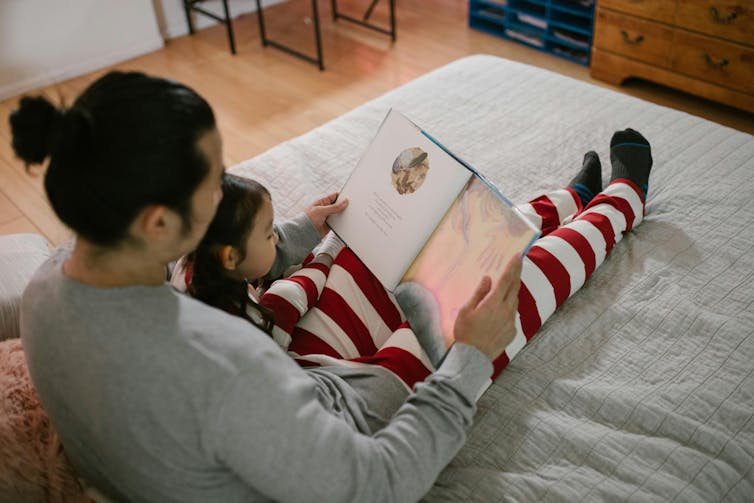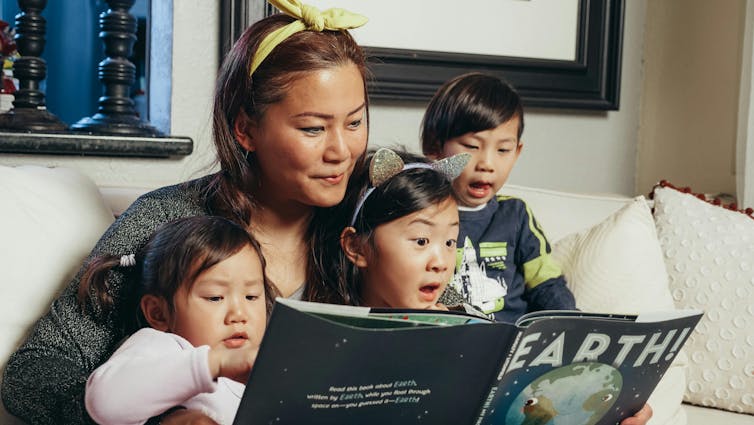
Is reading to your kids a bedtime ritual in your home? For many of us, it will be a visceral memory of our own childhoods. Or of the time raising now grown-up children.
Perhaps it involves a nightly progression through the Percy Jackson series or the next Captain Underpants book. Or maybe there’s a request to have Room on the Broom again (and again).
But for some households, reading aloud is not a regular activity. A recent UK report by publisher Harper Collins found many parents are not reading to their kids. Fewer than half (41%) of 0–4-year-olds are read to frequently. More than 20% of parents surveyed agreed reading is “more a subject to learn than a fun thing to do”.
The report also found some parents stop reading to their children once they can read by themselves. As the Guardian reported, some parents assume “it will make [their child] lazy and less likely to read independently”.
Here’s why it’s important to read to your children – even after they have learned to read.
What’s involved in reading skills?
Research on reading skills suggests there are two main types of skills involved in learning to read.
Constrained skills are skills that once we learn, we keep. For example, once we learn the alphabet we don’t have to keep learning it. It’s like riding a bike.
Unconstrained skills are skills we continue to learn throughout life. For example, vocabulary, reading fluency (how quickly and smoothly you read) and reading comprehension. Even as adults we continue to learn new word and language forms.
We know reading to infants and younger children can build early language skills, such as the sounds of words and the alphabet. Reading to older children is a simple way to build unconstrained skills.

RDNE Stock Project/ Pexels, CC BY
How reading aloud helps
The books we read aloud at bedtime to young readers tend to be those they can’t read themselves.
So it introduces more complex ideas, words and sentence patterns. This is why reading aloud to your children is a parental superpower – you can continue to build where the school learning stops.
Reading together can also encourage closeness between children and parents, as well as shared knowledge and laughs.
When you are reading to your child, they have your full attention, which also makes the time special.
What should you be reading?
Reading aloud doesn’t necessarily have to involve multiple chapters of a book. Research suggests what matters is that it’s something you are both interested in and enjoying.
You could read to your child on a device, or you could even tell a traditional tale without a book.
You could read poetry, news articles or magazine articles about a favourite football team or player – these can all build unconstrained literacy skills.
Even re-reading a beloved picture book from younger years can build fluency and focus on direct speech in text (especially when the reader does “funny” voices).

Kindel Media/Pexels, CC BY
How often should you read to your child?
Family life is busy and parents often have many commitments. So there are no rules, other than to make it fun. Don’t be put off by “how much you have to do” – a few minutes of engaged reading time together is better than none at all.
You could read to your child when you yourself are reading something and want to share it. If it’s too hard to read to your child every night, do it every weekend night or make another time during the week. Or ask a grandparent or older sibling to help.
And there is no set age to stop – if you like, keep reading to your kids until they leave home!
![]()
Robyn Cox does not work for, consult, own shares in or receive funding from any company or organisation that would benefit from this article, and has disclosed no relevant affiliations beyond their academic appointment.
Read More: Read More



